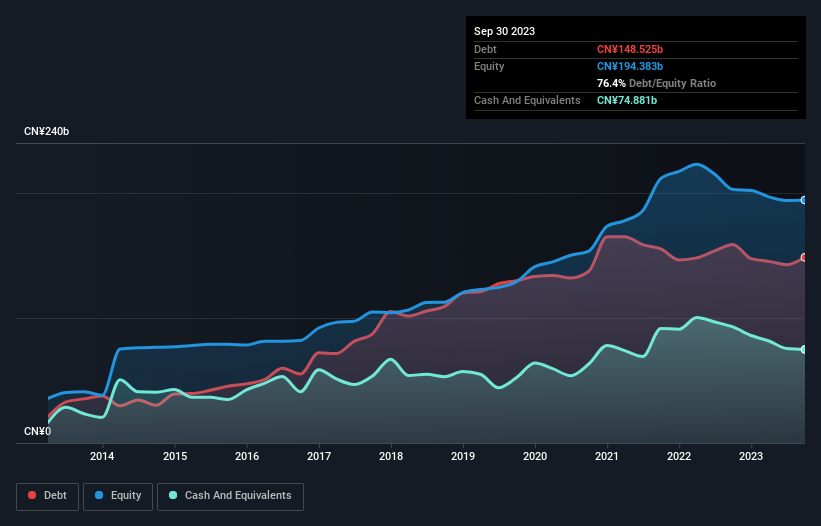- China
- /
- Electronic Equipment and Components
- /
- SZSE:000725
Does BOE Technology Group (SZSE:000725) Have A Healthy Balance Sheet?
Legendary fund manager Li Lu (who Charlie Munger backed) once said, 'The biggest investment risk is not the volatility of prices, but whether you will suffer a permanent loss of capital.' When we think about how risky a company is, we always like to look at its use of debt, since debt overload can lead to ruin. Importantly, BOE Technology Group Company Limited (SZSE:000725) does carry debt. But should shareholders be worried about its use of debt?
Why Does Debt Bring Risk?
Generally speaking, debt only becomes a real problem when a company can't easily pay it off, either by raising capital or with its own cash flow. In the worst case scenario, a company can go bankrupt if it cannot pay its creditors. However, a more common (but still painful) scenario is that it has to raise new equity capital at a low price, thus permanently diluting shareholders. Having said that, the most common situation is where a company manages its debt reasonably well - and to its own advantage. The first thing to do when considering how much debt a business uses is to look at its cash and debt together.
View our latest analysis for BOE Technology Group
What Is BOE Technology Group's Net Debt?
You can click the graphic below for the historical numbers, but it shows that BOE Technology Group had CN¥148.5b of debt in September 2023, down from CN¥158.9b, one year before. However, because it has a cash reserve of CN¥74.9b, its net debt is less, at about CN¥73.6b.

How Healthy Is BOE Technology Group's Balance Sheet?
We can see from the most recent balance sheet that BOE Technology Group had liabilities of CN¥89.0b falling due within a year, and liabilities of CN¥132.2b due beyond that. Offsetting these obligations, it had cash of CN¥74.9b as well as receivables valued at CN¥34.3b due within 12 months. So its liabilities outweigh the sum of its cash and (near-term) receivables by CN¥112.1b.
This is a mountain of leverage even relative to its gargantuan market capitalization of CN¥144.9b. This suggests shareholders would be heavily diluted if the company needed to shore up its balance sheet in a hurry. There's no doubt that we learn most about debt from the balance sheet. But it is future earnings, more than anything, that will determine BOE Technology Group's ability to maintain a healthy balance sheet going forward. So if you're focused on the future you can check out this free report showing analyst profit forecasts.
In the last year BOE Technology Group had a loss before interest and tax, and actually shrunk its revenue by 8.9%, to CN¥172b. We would much prefer see growth.
Caveat Emptor
Importantly, BOE Technology Group had an earnings before interest and tax (EBIT) loss over the last year. To be specific the EBIT loss came in at CN¥8.6b. When we look at that and recall the liabilities on its balance sheet, relative to cash, it seems unwise to us for the company to have any debt. Quite frankly we think the balance sheet is far from match-fit, although it could be improved with time. On the bright side, we note that trailing twelve month EBIT is worse than the free cash flow of CN¥12b and the profit of CN¥2.7b. So if we focus on those metrics there seems to be a chance the company will manage its debt without much trouble. When analysing debt levels, the balance sheet is the obvious place to start. But ultimately, every company can contain risks that exist outside of the balance sheet. For example, we've discovered 3 warning signs for BOE Technology Group that you should be aware of before investing here.
If you're interested in investing in businesses that can grow profits without the burden of debt, then check out this free list of growing businesses that have net cash on the balance sheet.
Valuation is complex, but we're here to simplify it.
Discover if BOE Technology Group might be undervalued or overvalued with our detailed analysis, featuring fair value estimates, potential risks, dividends, insider trades, and its financial condition.
Access Free AnalysisHave feedback on this article? Concerned about the content? Get in touch with us directly. Alternatively, email editorial-team (at) simplywallst.com.
This article by Simply Wall St is general in nature. We provide commentary based on historical data and analyst forecasts only using an unbiased methodology and our articles are not intended to be financial advice. It does not constitute a recommendation to buy or sell any stock, and does not take account of your objectives, or your financial situation. We aim to bring you long-term focused analysis driven by fundamental data. Note that our analysis may not factor in the latest price-sensitive company announcements or qualitative material. Simply Wall St has no position in any stocks mentioned.
About SZSE:000725
BOE Technology Group
Operates display, Internet of Things (IoT) innovation, sensor, and MLED, smart medicine engineering, and other business in Mainland China and internationally.
Very undervalued with flawless balance sheet and pays a dividend.
Market Insights
Weekly Picks

Solutions by stc: 34% Upside in Saudi's Digital Transformation Leader


The AI Infrastructure Giant Grows Into Its Valuation
Recently Updated Narratives


The "Sleeping Giant" Wakes Up – Efficiency & Monetization


The "Rate Cut" Supercycle Winner – Profitable & Accelerating


The Industrialist of the Skies – Scaling with "Automotive DNA
Popular Narratives


MicroVision will explode future revenue by 380.37% with a vision towards success


NVDA: Expanding AI Demand Will Drive Major Data Center Investments Through 2026



